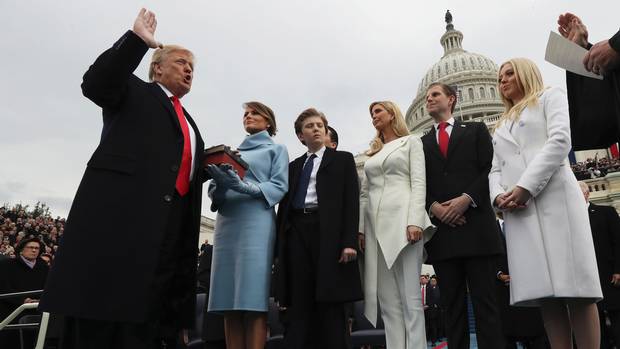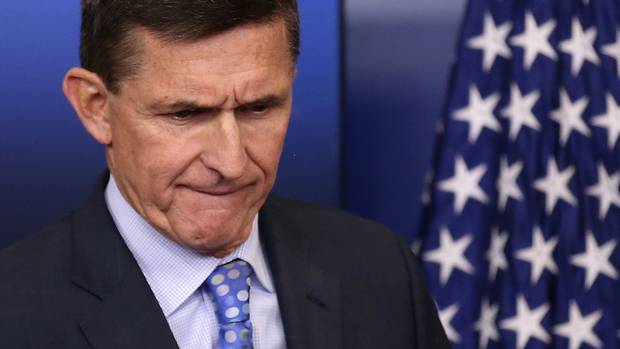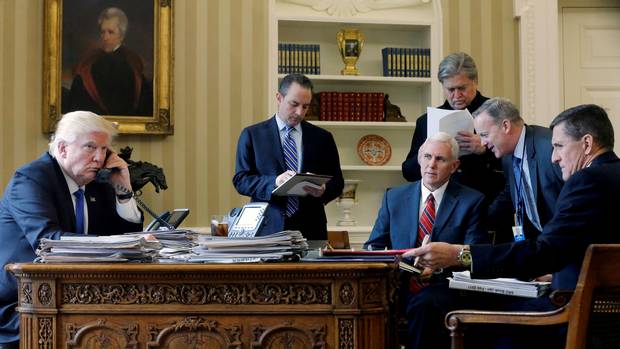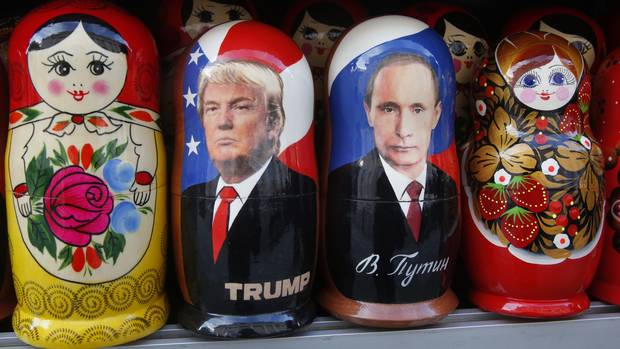A mounting scandal over ties between President Donald Trump's inner circle and Russian figures known to U.S. intelligence agencies is consuming the White House. Multiple investigations are unfolding, criminal charges are possible and a central question hangs over the entire affair: Did the President of the United States know that some of his associates were in touch with those Russians – or order those contacts?
The controversy swirls around two key episodes. The first is the hacking of the Democratic National Committee's e-mails during last year's presidential campaign and the delivery of a trove of embarrassing e-mails to Wikileaks. The Central Intelligence Agency believes the Russian government was behind the hacking with the intent of tipping the election toward Mr. Trump.
The second episode involves the brief tenure of Mr. Trump's national security adviser, Mike Flynn, whose conversations with Moscow's ambassador in Washington, Sergey Kislyak, weeks before Mr. Trump was inaugurated raised questions about the appropriateness of those contacts and what was discussed. Mr. Flynn announced his resignation on Monday. The White House said he was fired.
But, as it turns out, he was not alone: Reports by the New York Times and CNN reveal that intelligence investigations have discovered Mr. Trump's campaign officials, including campaign chair Paul Manafort, were regularly in touch with Russian operatives in the year before the election.
Here is your guide to what comes next in the ongoing saga involving the President, his men and Russia.

U.S. President Donald Trump takes the oath of office at his inauguration ceremony on Jan. 20, 2017.
JIM BOURG/AFP/GETTY IMAGES
Russia and the presidential campaign
What to expect from intelligence agencies
The Federal Bureau of Investigation, the Central Intelligence Agency and the National Security Agency are all said to be investigating Mr. Trump and his team's possible Russian connections. Among other things, they are investigating business and financial ties between Trump associates and Russia, and contacts between the two sides.
So far, these probes have not led to any charges. But leaks from former Obama administration officials and from inside the agencies to reporters have rocked the White House, with the revelations of talks with Russians involving Mr. Flynn and others. The results of the investigations might come out in the form of charges, in information shared with the congressional committees or further leaks.
What to expect from U.S. Congress
Both the Senate and House of Representatives intelligence committees launched investigations last month into Russian hacking and interference in the presidential campaign. The investigations will review documents and question witnesses – some in public hearings, others behind closed doors – and issue reports on their findings. Among other things, the committees have pledged to investigate "links between Russia and individuals associated with political campaigns." They have signalled they will not shy away from issuing subpoenas to compel Mr. Trump's officials to testify if necessary. Because the congressional investigations will produce public reports – and at least some public hearings – these investigations threaten to be politically damaging for Mr. Trump by revealing backroom Russian links and keeping the story squarely in the public eye.
Tellingly, both parties back these investigations, suggesting that even Mr. Trump's Republicans are worried about his potential Kremlin ties.

Michael Flynn arrives at the daily briefing at the White House in Washington on Feb. 1, 2017.
CARLOS BARRIA/REUTERS
The Flynn affair
What to expect from U.S. law
Mr. Flynn was interviewed by the FBI in his first week on the job. Exactly what he told the agents is not known, but if he gave them the same line he apparently gave Vice-President Mike Pence – that he had not discussed sanctions with Mr. Kislyak – he could face a criminal charge of making false statements, a federal offence that carries a five-year prison term. This law has been used in the past against political operatives who tried to cover up scandals: Lewis (Scooter) Libby, a George W. Bush administration official, was convicted of lying to investigators surrounding the leak of CIA agent Valerie Plame's identity to reporters; Rod Blagojevich, the former Illinois governor who tried to sell Mr. Obama's former Senate seat, was also convicted of making false statements to the FBI.
Some Democratic congressmen also argue that Mr. Flynn might have violated the Logan Act, a never-enforced 18th-century law that bars people from negotiating with foreign countries on the U.S.'s behalf without permission from the American government. This is because Mr. Flynn's conversation with Mr. Kislyak took place in December, before he took office, and Mr. Obama's administration was still in power.
The law, in force since 1799, was named after George Logan, a politician accused of carrying out unauthorized talks with French officials in 1798. While the act carries a three-year prison term and a fine, no one has ever actually been convicted under it and only one person has been indicted under it, in 1803.
What to expect from congressional Republicans
Several senators – including the top two Republicans in the upper chamber – have said Mr. Flynn's contacts with Russia should be investigated.
Senate Majority Leader Mitch McConnell suggested to reporters Tuesday that a review of Mr. Flynn could be added to the mandate of the intelligence committee that is already probing Russian interference in the election. His number two, John Cornyn, replied simply "yes" when asked if the Senate should probe the matter.
Members of the intelligence committee have called for Mr. Flynn to be questioned.
The House, on the other hand, looks less likely to launch a probe. Both Republican chairs of the House's intelligence and oversight committees have said they are not in favour of investigating Mr. Flynn. However, Devin Nunes, the intelligence chair, told CNN he would like to investigate who in the intelligence community keeps leaking information about the Trump administration to reporters.

U.S. President Donald Trump speaks with Russian President Vladimir Putin in the White House on Jan. 28, 2017. With him, from left, are chief of staff Reince Priebus, vice-president Mike Pence, senior advisor Steven Bannon, communications director Sean Spicer and national security adviser Michael Flynn.
JONATHAN ERNST/REUTERS
The big question
Donald Trump, Russia and Flynn
The central question for politicians, investigators and journalists is: How much did Donald Trump and his top people know about alleged Russian interference in the U.S. election or Mr. Flynn's conversations?
Last July, Mr. Trump called for Russian hackers to get their hands on Ms. Clinton's e-mails. He also praised the Russian dictator as a strong leader. But there is no proof that Trump staff were co-ordinating with the Putin regime.
There are still many unanswered questions. The Justice Department told the White House on Jan. 26 that Mr. Flynn had discussed sanctions with Mr. Kislyak but the President took no action until the media found out about Mr. Flynn's conversations two weeks later. And even now – after the White House insisted Mr. Trump fired Mr. Flynn – the President has continued to defend him.
"He's been treated very, very unfairly by the media," Mr. Trump told reporters Wednesday during a joint White House press conference with Israeli Prime Minister Benjamin Netanyahu. He described the leaks to reporters on Mr. Flynn a "criminal act."
Mr. Trump has also repeatedly dismissed or played down the connections between his team and Russia.
"This Russian connection nonsense is merely an attempt to cover up the many mistakes made in Hillary Clinton's losing campaign," he tweeted Wednesday, describing any suggestion of collusion with the Kremlin as "conspiracy theories."
Follow Adrian Morrow on Twitter: @AdrianMorrow
MORE FROM THE GLOBE AND MAIL




